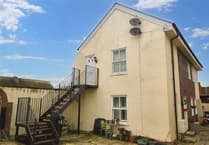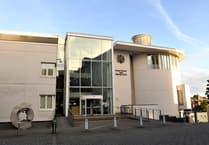Trago Mills has had its fine for dumping waste at two of its stores slashed after telling a judge that the clean up has already cost it almost half a million pounds.
Illegal tips and bonfires were found by Environment Agency inspectors close to the shops at both Newton Abbot and Liskeard in which unsold stock, old displays, and other rubbish had been dumped. The tips dumped and burned toxic waste including asbestos and plastics and released potentially deadly dioxins into the atmosphere, Exeter Crown Court was told.
Inspectors found two huge dumps and a burning pit close to the Newton Abbot site and a dump and bonfire hidden in a wooded valley behind their Liskeard store. A director had assured the Environment Agency there was no illegal dumping at Liskeard but a tip was found by chance when inspectors flew over it and spotted a scar on the landscape.
They then visited the scene and found employees throwing waste onto a bonfire which was still burning 11 days after being lit on Bonfire Night and where the ash was waist deep. Trago Mills and its sister company Charles Robertson Developments admitted five breaches of environmental legislation. They were fined £185,000 with £14,588 costs by South Devon magistrates in September and appealed to Exeter Crown Court yesterday (thurs). Judge Graham Cottle cut the fine to £65,000 after hearing that the pollution had cost the company far more than it could possibly have saved through illegal dumping. The costs remain the same.
The judge said he would give his reasons later in writing. Judith Constable, prosecuting, said Trago Mills was found dumping illegally at Newton Abbot in 2009 at three zones close to their superstore in Newton Abbot. The first was 43 by 33 metres and contained 6,000 tons of waste, the second was 38 by 21 metres, and there was also a large burning pit. Items dumped or burned included wood treatment fluids, oils, paints and cans, asbestos roofing sheets, unused stock from the garden centre, damaged electrical goods, a fish tank, and even a kitchen sink.
Some of the waste had been there so long it was covered in undergrowth. Miss Constable said: "The company blamed the problem on the failings of one individual but the board ought to have known the site better than that. This are was not far from the car park." She said director Malcolm Sandbach was interviewed and assured the Agency they would not find anything similar at Liskeard, however, another dump was later found there. Miss Constable said: "Network Rail were doing a flight over Cornwall and asked the Agency if they wanted to come. They flew over woodland and saw what appeared to be a huge illegal landfill site.
"This was previously unknown and in an area of beautiful countryside in a valley leading to a tributary of the River Fowey." She said inspectors then found pallets, timber, white goods, old displays, plastics, blinds, window frames and other items either dumped or put on a 20 by 10 metre bonfire. They saw employees putting more items on the bonfire, where the ash in places was waist deep.
The company told them it was left over from Guy Fawkes night 11 days earlier but it had been kept burning by new items being added to it. Miss Constable said: "The prosecution regard their attitude as being 'out of sight, out of mind'. There was no lack of money to pay for proper disposal because they had a turnover of £85 million in 2008 with a profit of £4 million. Richard Matthews, QC, said the company had thorough recycling policies and gained no financial advantage from the illegal dumping because they were already paying a contractor to get rid of unwanted waste.
He said the clean up had cost it £475,000; many times more than the cost of handling the waste would have been. He said much of the material at both sites was being stored in readiness for separation and recycling and had not been dumped. The directors were unaware of the other breaches. He said: "The company funded a proper system and put in place resources for it to work and that it why they were so frustrated when they found out it had not.
"The idea they would benefit in any way from disposing of something like 410 litre cans of paint is frankly ridiculous. The quantities the company dealt with properly was enormous.
"They chose to reinstate the land in the most expensive way possible. Every last ounce and particle was picked up in a Rolls Royce manner and as much as possible was recycled."
Trago chairman Bruce Robertson said after the hearing: 'Trago Mills is relieved that the Crown Court has corrected the grave injustice that was done by Torbay Magistrates.
'Trago accepted from the first moment, there had been failings in its systems and did all iin its power to put those right as soon as it was brought to the company's attention.
'A reduction of two thirds of the fines and the award of costs goes some way to righting that wrong and also certain of the comments made by the Environment Agency.'
Ends



